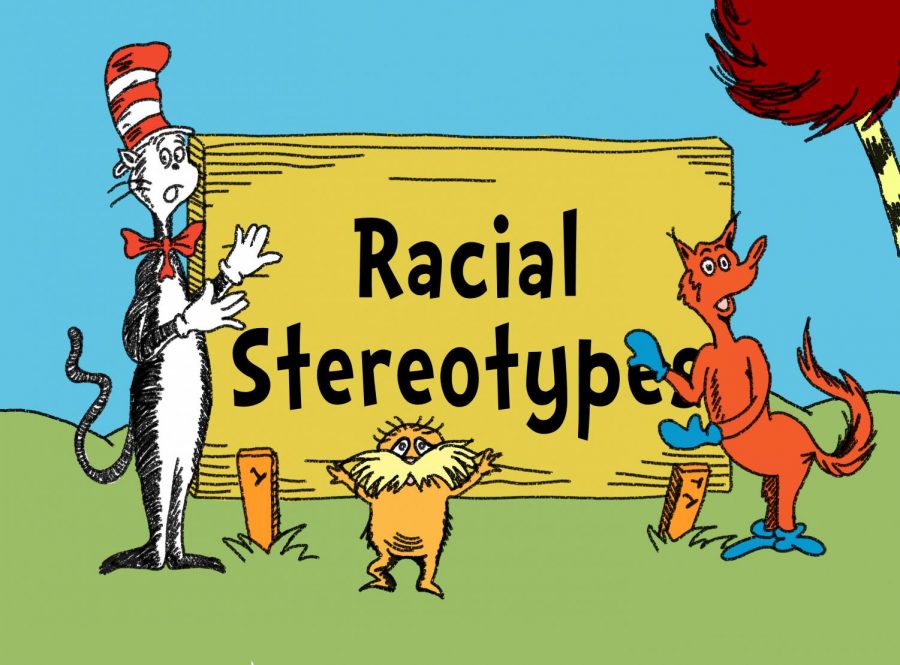Oh the Places You Won’t Go!
March 10, 2021
Theodor Seuss Geisel, commonly known by his pseudonym Dr. Seuss, has recently been bombarded by heavy criticism over a few of his early rhymes and illustrations. On what would have been the author’s 117th birthday, Seuss Enterprises announced that six books would cease publication. According to their statement, the selected texts draw on ethnic and racial stereotypes that are “hurtful and wrong.”
Dr. Seuss is one of the most long-lasting and popular children’s book authors, having sold over 700 million copies worldwide. It is hard to imagine a childhood without two or three Dr. Seuss books lying around, and as a result many people have established an attachment to the beloved stories; however, the attachment and cherished memories do not erase the blatantly racist imagery used in the books whose publication has been halted.
To say the books have not aged well is quite an understatement. In “And to Think That I Saw It on Mulberry Street,” there is a character described as “Chinaman” (publications in the 70s edited it to “a Chinese Man”) who carries chopsticks and a bowl of rice, wears a small red hat and has slanted lines for eyes. Meanwhile, the book “If I Ran the Zoo” includes two characters from “the African island of Yerka” that share striking resemblance to monkeys.
The other titles that will no longer be sold include “McElligot’s Pool,” “On Beyond Zebra!,” “Scrambling Eggs Super,” and “The Cat’s Quizzer.” If none of these titles seem familiar, there is a reason why; according to NPD BookScan, which tracks the sale of physical books, “One Fish, Two Fish, Red Fish, Blue Fish” sold more than 311,000 copies this year compared to “And to Think That I Saw It on Mulberry Street,” which BookScan recorded as only selling 5,000 copies. Logistically, it makes sense to halt the publication of these less popular titles, which proves a better reason compared to social repercussions.
Countless books deemed “classics” have been put under scrutiny because of their modern implications. Harper Lee’s 1960 work “To Kill a Mockingbird,” for instance, is continually challenged because of its themes of rape and use of frequent profanity and racial slurs. J.D. Salinger’s seminal 1951 novel “The Catcher in the Rye” is contested because of sexual scenes and themes of violence. Both examples have been reframed to become educational opportunities, as have hundreds of texts that feature controversial topics.
While both of these examples have been limited to mature audiences, the premise is still applicable to Dr. Seuss. However, it is important to note that the educational opportunity is not for children, but rather should be intended for the adults reciting the rhymes.
Parents and guardians must recognize the unacceptable aspects of texts before exposing children to their detrimental effects, but taking the books off the shelves is not the answer. Simply removing the books is an easy way around having difficult conversations about the problematic and offensive imagery in Dr. Seuss’s work. Instead, it is essential to keep the books, acknowledge their discriminatory and harmful nature, and use the experience to learn about the racism that informed their creation.
Many conservatives are referring to the recent criticism of Dr. Seuss as “cancel culture,” but the reality is quite different: Dr. Seuss is simply being exposed for his racist past. Because many people have fond memories of reading “Fox in Socks,” readers will never truly reject Dr. Seuss. Parents and children alike adore his books. However, the author’s legacy is being re-evaluated, which is clearly necessary. If anything, the removal of the six book titles does the opposite of cancel culture—it is using revisionist history to completely reshape Dr. Seuss’s legacy. By censoring Dr. Seuss’s work, Seuss Enterprises is wiping the foul racism from his timeline. If the books are no longer accessible, then he never wrote them, right?
While some people will never read “If I Ran a Zoo” the same way again, others will memorialize Dr. Seuss’s legacy by using the remaining silly rhymes as evidence, completely disregarding his banned books.
Seuss Enterprise ceased publication on six titles in an attempt to right Dr. Seuss’s fatal wrongs, but instead they missed a valuable opportunity to recognize flaws and turn them into opportunities for growth and redemption. By removing the books completely, people continue to read “The Lorax” without rightfully recognizing the author’s reliance on ethnic and racial stereotypes as well as remain unable to address and converse about the most pressing topics in today’s world.























Garfyv • Oct 11, 2022 at 4:05 pm
we see absolutely nothing racist, in amusing, not serious caricatures, it is healthy humor. Censoring these cartoons is dangerous.
Ken Tng • Jun 16, 2021 at 12:09 am
The banning of such books only demonstrates how sensitive and how easily offended the LEFTISTS are. To the LEFTISTS, everything is about RACE, GENDER, WHITE PRIVILEGE, and WHITE SUPREMACY these days. The LEFTISTS are WOKE and they think they are living in the 17th century.
Joe P Bering, Jr.,MD • Apr 30, 2021 at 8:58 pm
I am completely disregarding his banned books. If one truly believes that the long gone Dr. Suess deliberately intended hateful racial stereotyping in his children’s books they need to get a life. This is such “woke” orthodoxy BS.
Feigles-Kaar H Virginia • Mar 12, 2021 at 2:18 pm
Excellent!
Kenneth R Wagner Jr. • Mar 12, 2021 at 10:59 am
Haley, Very well written and I hope your article is shared by millions. Thank you for making sense out of this subject. It goes much farther than just Dr. Seuss but his literary works are more recognizable by the average person so a great “target”.